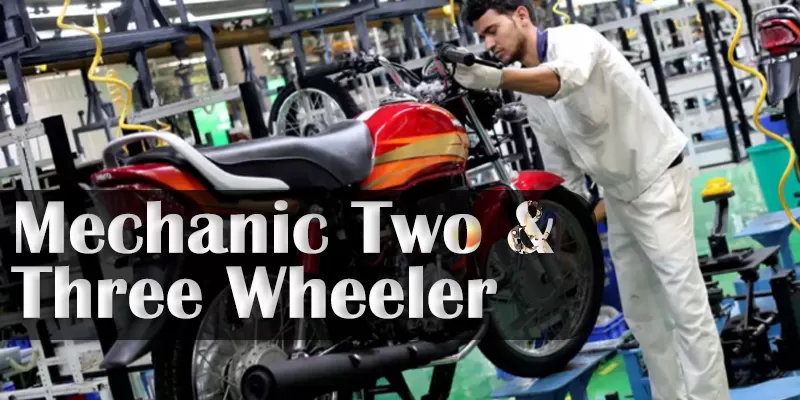
The "Mechanic Two & Three-Wheeler" trade is a one-year vocational training program designed to equip candidates with professional skills, theoretical knowledge, and employability skills essential for job roles in the two and three-wheeler automotive sector. This trade is structured under the Craftsman Training Scheme (CTS) and is offered by the Directorate General of Training (DGT) under the Ministry of Skill Development & Entrepreneurship.
During the training, candidates engage in project work, extracurricular activities, and on-the-job training to enhance their confidence and practical expertise. The course provides hands-on training and theoretical knowledge, covering various aspects such as safety measures, identification of tools and equipment, mechanical operations, electrical testing, welding techniques, engine dismantling and reassembly, fuel system servicing, and transmission system maintenance.
Key Learning Areas:
Safety and Tools Identification
Trainees learn about safety regulations in the workshop, fire prevention measures, first aid techniques, and the proper handling of tools and equipment. The program emphasizes the importance of a safe working environment and teaches candidates how to use measuring and marking tools effectively.
Basic Mechanical and Electrical Skills
The training covers:
- Fastening and fitting operations using various hand and machine tools.
- Basics of electricity, testing, and measuring electrical parameters.
- Battery maintenance and testing.
- Constructing and testing electrical and electronic circuits.
- Arc and gas welding for joining components.
- Non-destructive testing methods for auto components.
Engine Dismantling and Overhauling
Trainees gain expertise in:
- Dismantling two and three-wheeler engines following standard procedures.
- Overhauling components such as cylinder heads, valve trains, pistons, crankshafts, camshafts, and flywheels.
- Troubleshooting issues like excessive smoke, knocking, or abnormal engine noise.
- Reassembling engines in the correct sequence as per workshop manuals.
Servicing and Maintenance
The curriculum includes:
- Fuel tank servicing and component maintenance.
- Overhauling the steering and suspension systems of three-wheelers.
- Brake system maintenance and troubleshooting.
- Transmission system repairs, including manual and automatic transmissions.
- LPG and CNG fuel system maintenance.
Employment Opportunities
Upon successful completion of the training, candidates are awarded a National Trade Certificate (NTC) by the DGT, which is recognized worldwide. Trainees can pursue careers in the following roles:
Mechanic, Motor Cycle
This role involves repairing, servicing, and overhauling motorcycles, scooters, and auto-rickshaws to keep them roadworthy. Mechanics diagnose faults by running the engine in a stationary position or by test-driving the vehicle. Responsibilities include dismantling and assembling engine parts, adjusting control cables, setting tappets, aligning wheels, and ensuring optimal vehicle performance.
Auto Service Technician (Two and Three Wheelers)
These professionals specialize in repairing and maintaining two and three-wheeler vehicles, including both mechanical and electrical systems. They diagnose vehicle problems, plan and organize repair tasks, and ensure proper execution within defined limits. Auto service technicians are responsible for:
- Detecting and resolving technical issues.
- Demonstrating and communicating repair procedures.
- Performing routine servicing and preventive maintenance.
Learning Outcomes
Trainees are expected to demonstrate proficiency in the following areas:
- Adhering to environmental regulations and maintaining workshop housekeeping.
- Performing precision measurements and marking techniques using specialized tools.
- Executing fastening and fitting operations with accuracy.
- Conducting surface finishing operations in automotive work.
- Constructing and testing electrical circuits using measuring instruments.
- Testing electrical components in two and three-wheelers.
- Performing battery charging and testing operations.
- Constructing and testing electronic circuits.
- Joining metal components using arc and gas welding techniques.
- Inspecting auto components using non-destructive testing methods.
- Identifying hydraulic and pneumatic components in vehicles.
- Understanding vehicle specifications and operating service station equipment.
- Conducting general servicing of two and three-wheelers.
- Overhauling two and three-wheeler engines.
- Servicing and repairing cylinder head assemblies.
- Diagnosing engine issues such as excessive smoke and abnormal noise.
- Servicing fuel tanks and associated components.
- Overhauling the steering and suspension systems.
- Repairing front and rear wheel assemblies and braking systems.
- Overhauling manual and automatic transmissions.
- Repairing and maintaining AC generators.
- Testing ignition circuits and ensuring proper functionality.
- Overhauling LPG and CNG fuel systems and analyzing exhaust smoke emissions.
- Servicing and maintaining electric two and three-wheelers.
Conclusion
The ITI Mechanic Two & Three-Wheeler trade equips trainees with the skills needed for employment in the automotive repair and service industry. With hands-on training in mechanical and electrical systems, engine diagnostics, transmission repairs, and fuel system maintenance, graduates are well-prepared for a variety of job roles in the automotive sector. The course provides a strong foundation for those looking to build a successful career in two and three-wheeler mechanics, whether through employment or self-employment opportunities.
